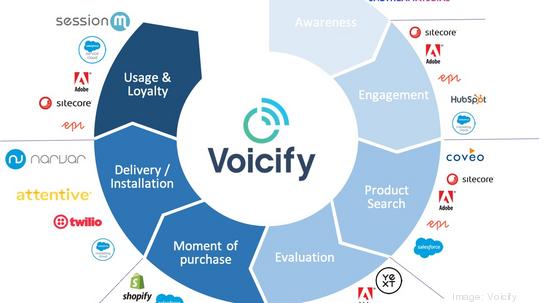
Recognized two years ago as a BostInno ‘50 on Fire’ honoree, a local voice assistant development company has forged partnerships with several household names, including Google and the Philadelphia Eagles.
Voicify, founded in 2018, aids its clients with customer service call centers, video commerce and employee engagement. The startup's voice assistant technology is used in Amazon Alexa, Google Assistant, Samsung Bixby, Custom Voice Assistants, and other web, SMS and chatbot customer service apps.
In March, Voicify was selected as one of 10 participants for Google’s first startup accelerator program, a 10-week program that runs through May.
As a voice assistant app, Voicify's technology was selected to collaborate with the Google Assistant team in solving several challenges — most importantly, allowing the user to move from one task, such as setting a reminder to pick up dinner tonight, to another, like checking the weather, with greater ease and intelligence.
The Google accelerator's demo day brought the company “astounding feedback from the larger Google community, as well as Voicify’s community. It’s really helped influence and shape not only our product, but we think Google's product as well with Google,” said Chief Strategy Officer Jason Fields.
Voicfiy’s success is largely attributed to its bootstrap funding endeavors and through its participation in accelerators.
Since it was founded, the company has used its original funding with a team of 15 people to grow the company. It now has its voice automation product in roughly 100 agencies across the U.S. and Europe.
As it expands, the company is working to create more interpersonal communication between the user and their voice assistants.
“Our platform in 3.0 was refactored to allow the ability for brands not to even have to think about what the structure of that flow conversation flow is. We've knocked it out and created what we call the module,” Fields said.
The 3.0 model, rather than just working as a voice assistant, will be able to recognize a consumer’s interest in a particular product. After a company runs the product ad on a user’s Alexa or Google Home, the user can verbally express their interest in a product and have a conversation about where to buy it and how.
This model is still being approved by major partners, and the three founders expect it will be on the market soon.



